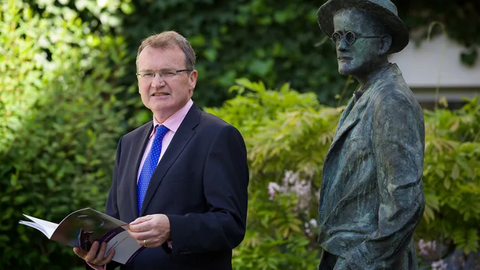'Trump always chickens out': leading economist reacts to court tariff decision

Economist Jim Power has described the International Court of Trade's decision to block US President Donald Trump's 'reciprocal' tariffs from coming into effect as “the latest manifestation of gross uncertainty" that has characterised Trump's second White House term.
Speaking ahead of the France-Ireland Chamber of Commerce (FICC) business lunch in Dublin on Thursday, Power estimated 58 official tariff announcements by the Trump administration since his inauguration in January prior to the court decision.
“It has been chaos, it has been uncertain, it has been volatile, and they don’t call him the TACO President for nothing: Trump always chickens out," he said. An appeals court subsequently temporarily overturned the ruling, creating further confusion.
“I guess the problem from a business perspective is, through this intense uncertainty, how do you plan investment? How do you plan recruitment in an environment where the ground rules are changing day by day?”
Specifically regarding the New York court's decision, Power described it as "a serious blow" to Trump's anti-free trade agenda, and expressed hope that it would "embolden" other countries and US businesses "to stand up to this nonsense" while admitting "there’s still a lot of water to flow under the bridge before we can be certain of the outcome."
On the hard impact of the tariffs to date, Power said that the economic data for the first six months of the year will be "seriously distorted," as highlighted by the surge in pharma exports from Ireland to the US in anticipation.
"In terms of the real economic and business impact, certainly from an economic perspective, it is not yet coming true in the data.
"The Irish economic data generally is still pretty decent: tax revenues; the labour market is very strong; the export performance is exaggerated by what's happening with the States, but it's still a strong underlying export performance and even consumer spending in April … is a little bit stronger after a weak start to the year," he continued.
"It's not coming true in the real economic data yet, but I suspect where we will see it coming true is in terms of business expenditure, investment, and where I'm already hearing, you know, within the advertising industry, there's been a significant tightening over the last couple of months.
"I'd be surprised if it was anything other than that, because if you as a business are faced with this massive, massive wall of uncertainty, I just think battening down the hatches is probably the safest thing to do until you get some clarity, some transparency at the other end.”
Chris Smyth, president of the FICC and CEO of Perennial Freight, said many of the Chamber's members and their suppliers in Ireland and France have been affected by derisking from the US since the back end of last year and moving their trade to Europe and the Far East.
"There’s huge uncertainty, nobody knows what’s happening, but it seems to be with Trump, one step forward, two steps back every time.
"In that situation, any business, you can’t legislate for that kind of carry on," he explained.
Approximately €10.2bn of the €13.5bn worth of goods that Ireland imported from France last year were transport equipment such as cars from Renault and Peugeot, but Ireland also brings in wine, fresh food (fruit, vegetables, meats, cheeses) and chemicals as well as raw materials for modular homes and windows.
Post-Brexit and post-Covid, the boom in online shopping has ensured that a growing number of products from Spain, France, Italy and Germany are imported to Ireland through Cherbourg, although Smyth believes the UK land bridge will see more trade as a result of "softening" UK-EU relations.
Trade is growing, but France lags behind Germany and even the Netherlands in terms of the value of trade with Ireland, which Smyth puts down to the difficulty of getting into business with the French and, perhaps, Irish impatience.
"You have to court them for a long, long time," he said of French businesses.
"You have to get in, you have to build a relationship, they have to get to know you, and then they let you quote for the business.
"If you’re competitive, and the service is good, then you’ll get the business. If you get the business, you’re going to have that for life.”
“They're not as price sensitive in France, it's all about relationships, and it's all about the service and, you know, trust.”
"That’s held people back, maybe we’re a little but impatient here in Ireland about dealing with France. Maybe we need to be doing a bit more than just playing the long game.
"But certainly, it's a huge economy. It's very near to us. You know, there's no reason why we shouldn't be doing more and more trade into France and from France to Ireland."